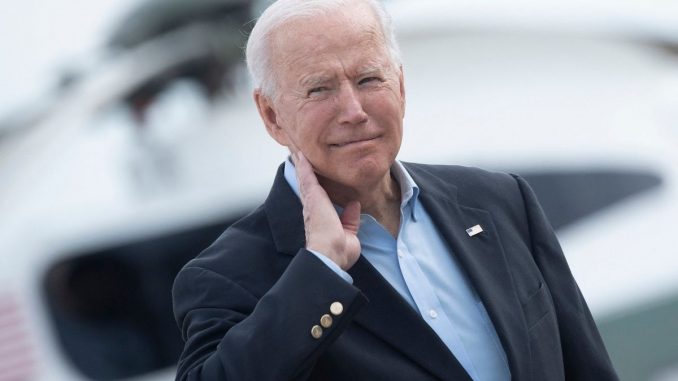
President Biden is seeking to go back on offense and reclaim the narrative surrounding his presidency after a brutal August that saw his approval rating drop amid the chaotic fall of the U.S.-backed government in Afghanistan and rising COVID-19 cases at home.
The White House has long seen the coronavirus pandemic as the key issue in Biden’s presidency, and the Biden comeback effort is centered around convincing the public that the president is providing sound leadership on the issue.
During the first few months of Biden’s presidency, his team was confident that voters had faith in the President’s leadership on the issue, but the falling poll numbers and staggering pandemic has raised questions about whether the public confidence is wavering.
Biden on Thursday offered a bristling speech where he blamed the spread of the COVID-19 virus on the unvaccinated while announcing measures that require federal workers to get vaccinated.
The remarks on the pandemic were a pivot for Biden, who previously had avoided embracing mandates and who adopted a much more scolding tone toward unvaccinated Americans.
“We’ve been patient,” Biden said. “But our patience is wearing thin and your refusal has cost all of us.”
Democrats acknowledge the next few months are critical for Biden, who along with Democrats are already looking ahead to 2022, when House and Senate majorities now held by the party will be up for grabs in the midterm elections.
Biden is also facing a pivotal moment on his domestic agenda as Democrats try to put together a deal on a $3.5 trillion spending package that would reshape much of the social safety net. Biden’s legacy is likely on the line when it comes to the legislation’s success.
An NPR-PBS Newshour-Marist poll out last week showed Biden with a 43 percent approval rating. More importantly, the survey showed him falling to 36 percent support from independents, a drop of 10 points from July. A Washington Post-ABC News poll subsequently showed Biden with a 36 percent approval rating among independents, with 57 percent saying they disapproved of Biden.
“I think this is the first point in the presidency where President Biden’s numbers are underwater and more doubt exists than at any other point,” said Democratic strategist Joel Payne. “It’s important not to allow those moments to settle in.”
“There’s certainly a desire to turn the page and reset the narrative quickly,” he added.
The Biden White House is betting that a majority of Americans will agree with him that the unvaccinated are holding the nation back when it comes to a recovery from the pandemic.
He’s also hoping to tie GOP opponents to those refusing to get vaccinated.
The stakes are high for Biden.
Republicans in August saw an administration in freefall, and their chances of winning GOP majorities in Congress at an all-time high for the year.
Some Democrats also fault Biden for losing control of the political debate as the administration was hammered over Afghanistan. Biden has also come under criticism from some quarters for giving Thursday’s speech too late.
“Whether caught up in the Afghanistan withdrawal or surprise at the spread of the delta variant, Biden’s voice was heard second, after detractors and potential 2024 opponents including the former president,” said Basil Smikle, the former executive director of the New York State Democratic Party. Smikle referenced former President Donald Trump, who has been trying to get more attention in recent weeks with regular statements blasting Biden.
Smikle said Biden’s “more aggressive tone” on vaccinations on Thursday showed command over the federal bureaucracy and a willingness to use the bully pulpit to get the virus under control.
“It’s critical for him to show strength and authority at this juncture with K-12 and college students nervously going back to in-person learning, the SCOTUS decision on evictions moratoriums and sports arenas going to full capacity,” Smikle said. “He can’t appear to be distracted again. That’s not good for overall engagement on the pandemic but politically has ramifications for midterms.”
The Supreme Court recently ruled against Biden’s actions to keep a ban on evictions in place.
The coming weeks will prove to be the ultimate test for Biden, historians say, and whether he can lead from a position of strength.
“It is an important moment,” said Julian Zelizer, a professor of history and public affairs at Princeton University.
Zelizer pointed to former President Jimmy Carter, who confronted a string of crises beginning in 1979 with the oil crisis, a sluggish economy, the Soviet Union invasion of Afghanistan and the Iran hostage crisis. Carter’s perceived handling gave his then-opponent Ronald Reagan easy talking points against him and led to a blowout in the 1980 presidential race.
He said for Carter, perception became reality.
“Carter worked hard on all of these, often being more effective behind the scenes than people understood, such as moving forward the negotiations to free the hostages in Iran,” Zelizer said.
“But the perception that he had lost control, that he was struggling to find answers, that he had no plan, all of this played into Reagan’s attacks that he was incompetent and a failed leader,” Zelizer added.
“Americans don’t like when Presidents seem overwhelmed by the crises they face, even if some of what’s happening is beyond their control,” he added.
Via The Hill
